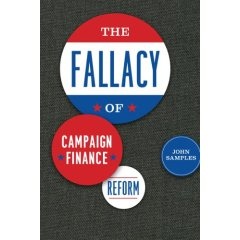The Fallacy of Campaign Finance Reform is, I believe, the best book available on one of the most important issues in American political science: campaign finance restrictions. I say that not because the author is an esteemed colleague (and co-author) at the Cato Institute, but because this is the very best book to read on the subject of campaign finance laws and their impact on the American political system. It is fair. It is judicious. It is informed. It is well written. It has the unusual and very welcome feature of going from political theory to empirical evidence and then back again, testing claims against the facts and drawing conclusions, rather than merely making unsubstantiated claims and then drawing equally unsubstantiated conclusions from them. The Fallacy of Campaign Finance Reform has its eye on the ideal, but it is rooted in bedrock reality. Even the most die-hard advocate of limiting our freedom to support the candidates, parties, initiatives, or causes of our choice will be shaken by the arguments and the evidence in this book. The open-minded will be, I think, convinced that restrictions on campaign financing have had baleful effects.
After briefly surveying and listing the basic issues involved in campaign finance “reform” (a loaded term, as he notes), John very ably and — unusual in a book about such a controversial topic — fairly and sympathetically describes and contrasts two dominant American visions of politics, which he describes as Madisonian and Progressive. The Madisonian vision is rooted in the American Declaration of Independence, with its assertion of rights and of the legitimacy only of governments of limited purposes (“to secure these rights”), whereas the Progressive view attempted, in the words of Progressive leader Mary Follett, to reject “the crudities of the Declaration of Independence,” on the grounds that “the theory of government based on individual rights no longer has a place in modern political theory.” Rather than all that folderol about equal natural rights or government resting on the consent of the governed, the people should be ruled by experts whose greater knowledge will realize the true will of the people, even if the ignorant masses don’t know what their true will is. For the Progressives, government creates rights, which are, in any case, mere permissions from the state that can be revoked when the experts no longer consider such “rights” to be in the public interest. Property, in that view, is a mere creation of the state and all property rights are indistinguishable from “welfare rights,” as contemporary Progressive Cass Sunstein has argued in his books. Sunstein follows the logic of Progressive thought to its conclusion: “In a regime of property rights, there is no such thing as no regulation of speech; the question is what forms of regulation best serve the purposes of the free speech guarantee.” Since all property is a grant (“welfare”) from the state, the state isn’t violating any rights when it says you can’t use your property to advance your views, especially if those views are critical of the state.
After his illuminating treatment of the Madisonian and Progressive visions, John goes right to the heart of American political theory, with a deep analysis of the concepts of “representation” and of “corruption,” after which he turns to the empirical claims on which Progressive support for restrictions rests. John examines the usual claims that donations to campaigns cause distrust in government and depress political participation, that “negative advertisements” keep people away from the polls, and so forth, and then tests them against the evidence.
Evidence is the central virtue of this book. After quoting a court decision that asserted that campaign donations create “a political system unresponsive to the needs and desires of the public, and causing the public to become disillusioned with and distrustful of the political system,” John suggests using a scientific approach: “Whether contributions have had that effect depends on empirical evidence, not armchair speculation, however appealing or apparently logical.” He formulates the Progressive claims as testable hypotheses and then tests them against the evidence. The result is a stunning refutation of Progressive politics. As he notes, there is a “final irony,”
Progressivism began, as we saw, with a firm belief that experts should rule based on scientific evidence. Such evidence has been gathered about campaign finance, but it has had little effect on the effort to restrict money in elections.
So far, at least. I sincerely hope that John’s collection of evidence will force a re-thinking of the issue of campaign finance restrictions. The health of American politics and the future of American freedom depend on it.










